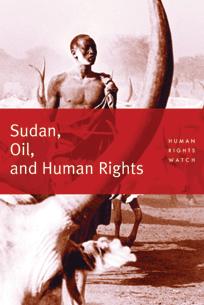Human Rights Group Calls On Oil Cos To Suspend Sudan Work
By Mark Long
 LONDON, Nov. 25, 2003 (Dow Jones) — A human rights organization Tuesday called on oil companies to suspend their oil development activities in Sudan, saying their presence in the civil war-torn nation exacerbates human rights violations.
LONDON, Nov. 25, 2003 (Dow Jones) — A human rights organization Tuesday called on oil companies to suspend their oil development activities in Sudan, saying their presence in the civil war-torn nation exacerbates human rights violations.
Human Rights Watch issued a report saying the oil development activities of China National Petroleum Corp., Malaysia’s Petronas, Austria’s OMV AG (OMV.VI), Sweden’s Lundin Petroleum (LUPE.SK) and Canada’s Talisman Energy (TLM) have amplified Sudanese government-led abuses of local populations in disputed areas in the African nation.
“Human Rights Watch therefore recommends that all foreign oil companies immediately suspend their operations in Sudan, and agree to resume them only when certain minimum human rights benchmarks are set,” the group said in a summary of its report.
A spokesman for Talisman, which earlier this year completed the sale of its Sudan holdings to ONGC Videsh Ltd., a subsidiary of India’s national oil company, said he hadn’t seen the report and couldn’t comment.
Lundin sold its interest in one oil asset in June, but retained an interest in an undeveloped exploration block.
Christine Batruch, vice president of corporate responsibility for Lundin, said the sale of its interest in the producing block was commercially driven, and added the company was hopeful ongoing peace talks would prove successful so work can commence on the block it retained.
Batruch also denied Human Rights Watch’s assertion that oil development became a focal point of conflict in Sudan’s 20-year civil war, leading to the displacement of hundreds of thousands of people.
“The connection between oil activities and displacement is not there,” Batruch said, adding oil development in the past few years has provided the economic base for the nation to formulate a lasting peace.
No one from CNPC, Petronas or ONGC could be reached immediately for comment.
Since 1983, Sudan has been torn by a civil war between the Khartoum-based government and the rebel Sudan People’s Liberation Army, or SPLA, which is seeking autonomy over southern areas of Africa’s largest country by area.
The war has claimed more than 2 million lives, mainly because of war-induced famine.
In a breakthrough after more than a year of talks, the government agreed in September to let the SPLA retain its force in the south – the main area of conflict – for a six-year transitional period.
Jemera Rone, Sudan researcher for Human Rights Watch, said the group issued its report now, despite the peace talks, to dissuade oil companies continuing oil development in Sudan.
Rone said a sticking point in the peace negotiations has been the government’s and SPLA’s failure to agree on how to split oil revenues, which she said amount to around $500 million a year.
